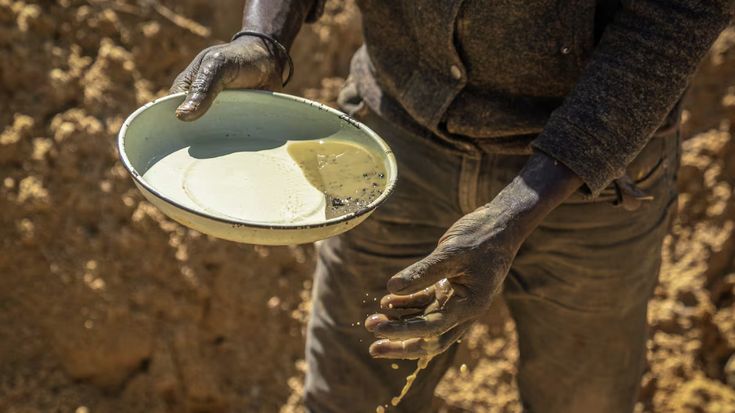Nigeria is endowed with abundant solid mineral resources, including gold, tin, limestone, and tourmaline. However, the mining sector is poorly regulated, leading to significant challenges such as illegal mining, environmental degradation, and loss of revenue.
The root cause of these issues can be traced to the limitation of mining to the exclusive legislative list, limiting state and local governments’ ability to regulate or oversee mining activities effectively, even when they are closest to the mining sites. Only the federal government has authority on items on the exclusive legislative list.
The centralization of mining under federal authority has created a regulatory vacuum, allowing illegal mining to flourish. For instance, in November 2024, Humangle reported rampant illegal gold mining in Zamfara State. These activities involve not only adults but also vulnerable teenagers, who are often subjected to unsafe working conditions, resulting in injuries, fractures, or fatalities. The practice of “blind digging” – digging subsurface minerals without proper geophysical investigation – is common, leading to frequent accidents.
Zamfara is not an isolated case. A Premium Times investigation uncovered illegal mining of tin ore in Plateau State, where workers prioritize quick profits over safety. Collapsed mining holes frequently trap or kill miners, yet the absence of regulatory oversight perpetuates this cycle of danger and neglect.
In June 2024, a mining site in Shiroro, Niger State, collapsed, killing 15 people and injuring many others. According to an International Centre for Investigative Reporting (ICIR) investigation, residents blamed the mining company for using unsafe excavation methods and failing to protect workers. Such tragedies highlight the consequences of weak enforcement of safety regulations.
Earlier in 2019, the ICIR exposed unsafe gold mining practices in Ifewara, Osun State. Many artisanal miners operated without geophysical surveys, relying on guesswork. Fatal collapses were met with indifference, as survivors moved on without addressing the underlying safety risks.
The Role of Geophysical Surveys in Safe Mining
Geophysical surveys are critical for safe and efficient mining. These surveys provide essential data on the subsurface, including information about mineral deposits, groundwater, and faults. The Nigeria Geological Survey Agency (NGSA) emphasizes the importance of geophysical surveys for geological mapping and mineral exploration.
By skipping this vital step, illegal miners expose themselves and their communities to significant risks, including ground collapses and environmental damage. Unfortunately, the centralized regulation of mining in Nigeria has made it difficult to enforce compliance with such safety standards, especially in remote areas where federal oversight is limited.
Weak Enforcement of Mining Laws
The Minerals and Mining Act (2007) provides a legal framework for mining activities in Nigeria. For example:
Section 1 vests ownership of all mineral resources in the federal government and prohibits unauthorized extraction.
Section 70(g) mandates that mining companies conduct environmental impact assessments (EIAs) and geophysical surveys before commencing operations.
Section 118 requires leaseholders to rehabilitate mined land and implement proper environmental management plans.
Despite these provisions, the law is often flouted by both legal and illegal miners. This is largely due to the federal government’s inability to effectively monitor and enforce these laws across Nigeria’s vast and mineral-rich landscape.
Environmental and Socioeconomic Impacts of Poor Regulation
Illegal mining and poor enforcement of environmental laws have dire consequences for local communities and ecosystems. A report by The Cable revealed that gold mining in Osun State has contaminated water sources, displaced fishermen and farmers, and threatened the Osun-Osogbo Sacred Grove, a UNESCO World Heritage Site.
By failing to enforce environmental management requirements, mining activities destroy ecosystems, reduce biodiversity, and deprive communities of their livelihoods. The centralized control of mining exacerbates these issues, as the federal government struggles to address the environmental and social impacts at the local level.
A Case for Decentralizing Mining Regulation
Placing mining on the exclusive legislative list has created significant bottlenecks in the regulation and management of Nigeria’s mineral resources. The federal government lacks the capacity to oversee mining activities across all states effectively, resulting in poor communication, weak enforcement of laws, and unchecked illegal mining.
To address these challenges, state and local governments should be empowered to regulate and manage mineral resources within their jurisdictions by moving the legislation on the mining sector to the concurrent or residual legislative list. A decentralized approach would:
1. Enhance local oversight of mining activities.
2. Allow for more effective enforcement of environmental and safety standards.
3. Ensure communities benefit from the exploitation of resources in their areas.
States and local governments could provide quarterly reports to the federal government, ensuring accountability while addressing the regulatory gap created by centralization. Strengthening the enforcement of existing mining laws, coupled with empowering local authorities, is critical for safeguarding Nigeria’s mineral wealth and protecting its environment.
By decentralizing mining regulation and strengthening enforcement mechanisms, Nigeria can create a more sustainable and equitable mining sector that benefits all stakeholders while preserving the environment for future generations.

Lawal Sofiyyat Bolanle
Lawal Sofiyyat Bolanle is a freelance journalist with interest in education and healthcare sectors' policies.

